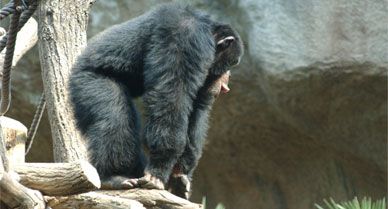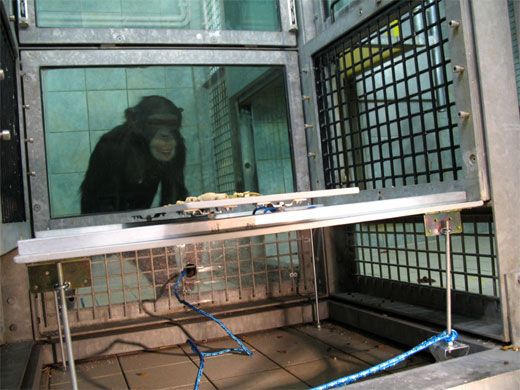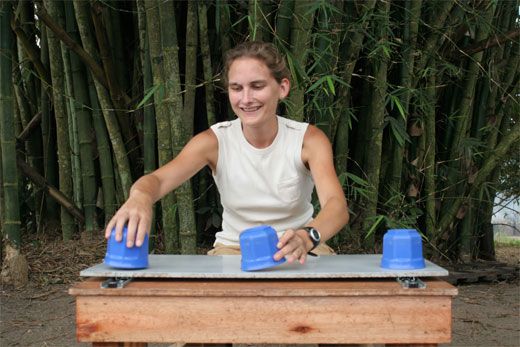Animal Insight
Recent studies illustrate which traits humans and apes have in common—and which they don’t
/https://tf-cmsv2-smithsonianmag-media.s3.amazonaws.com/filer/ape631.jpg)
Like any other close relative at the family table, chimpanzees may throw vengeful fits, but they also lend a helping hand.
A recent spate of experiments out of the Max Planck Institute for Evolutionary Anthropology in Leipzig, Germany, has revealed that chimpanzees exhibit some of the same traits—altruism and vengeance—displayed in human society. Spiteful motivations and sophisticated social learning skills, however, appear uniquely human.
The new studies give insight into how and when such traits evolved. Most importantly they help answer the age-old question: What makes us lucky bipeds human?
"The most important way to ask these really hard questions—is human altruism unique, is human spite unique, is human fairness unique—is to ask non-human animals," says Laurie Santos, director of the Comparative Cognition Laboratory at Yale University. This behavioral process of elimination defines humans as it progresses.
Since chimpanzees can't speak our language, researchers design experimental scenarios to detect the presence or absence of such traits. Recently, Felix Warneken, a developmental and comparative psychologist at Max Planck, and his colleagues conducted a series of tests to see whether chimpanzees were helpful—or, as they put it, "spontaneously altruistic."
To do this they compared the behavior of children with that of chimpanzees, one of the two closest relatives to humans (the other being bonobos). If chimpanzees engaged in helpful behavior, it would suggest that the trait went as far back as a common ancestor to chimpanzees and humans, some five to seven million years ago.
"If any animal or human passes this task, we have to assume that this organism possesses certain skills," Warneken says. "We're not just trying to attribute something to them."
In the first test, an adult human stretched for a baton that was out of its grasp but within the reach of the chimpanzee, or an 18-month-old infant. If the test subject passed the baton to the adult, the researchers considered it an act of "spontaneous altruism." In the end, chimpanzees and human infants were equally helpful, the researchers report in the July PLoS Biology. When the scientists made it a bit harder for the subjects to help, by erecting some obstacles, the results remained the same.
In the final experiment, chimpanzees were given the opportunity to help out one another—and sure enough, they obliged. More often than not, the chimpanzees opened a door that allowed a fellow chimp access to some food. The results represented a breakthrough, as previous lab experiments had found the opposite.
"It looks like, in certain situations, chimps are very helpful and as helpful as young children," says Brian Hare, a Max Planck psychologist involved in the study. "So probably whatever makes us human in terms of our helping and cooperative behavior … it didn't spring out of nowhere during human evolution."
On the opposite end of the behavioral spectrum, Keith Jensen, also at Max Planck, recently found that chimps are likely to exact revenge as well. Given the chance, chimpanzees retaliated against thieves by collapsing the bandit's table, thereby ruining the stolen meal, Jensen reports in the Aug. 7 Proceedings of the National Academy of Sciences. The idea is vengeance acting as a deterrent. In other words, you steal from me, I punish you enough to make you think twice before taking my banana the next time.
This type of vengeance, even if it takes the ugly form of punishment, is healthy in that it discourages freeloaders. So even if vengeance is considered bad, it can often serve the greater good.
Spite, however, doesn't appear to have any such obvious perks, which might explain why chimpanzees didn't exhibit it in Jensen's experiments. When an adult person took food away from one chimpanzee and gave it to another, the first chimpanzee didn't collapse the second chimpanzee's table, the researchers found.
"I'm not very surprised that we don't see a lot of spiteful behavior in the chimps," says Joan Silk, an anthropologist at the University of California, Los Angeles who was not affiliated with the study. "In some sense it's a little bit irrational, because you hurt yourself to hurt someone else more."
Still if the chimpanzees don't display spite, then why do humans? Spite, which Jensen describes as "altruism's evil twin," might help motivate behaviors related to a sense of fairness, he says. "In the absence of punishment, at least in studies that have been done on human adults, cooperation falls apart, because it only takes a few selfish individuals … to ruin everything for everybody," Jensen says. "But if you give people the opportunity to punish free riders, they stop cheating."
Other differences between human and chimpanzee behavior have been teased apart by testing infants, chimpanzees and orangutans in identical conditions. Esther Herrmann of Max Planck recently found that apes and two-and-a-half-year-old children performed similarly on tasks that tested their understanding of the physical world, such as space and quantities.
For example, chimpanzees were better than infants at detecting added quantities of food or toys, a rudimentary math skill. Their spatial relationships were similarly developed; both extracted food and toys from difficult places.
However, the similarities in their cognitive skills broke down when it came to Herrmann's social learning tests, she reports in the Sept. 7 issue of Science. Herrmann says these social cognition skills, which people display more often than chimpanzees, are the same skills that give us the leg up to perpetuate our culture and society.
"Human children have much more sophisticated skills dealing with the social world like dealing with imitating another's solution to a problem, communicating non-verbally and reading the intentions [of] others," Herrmann says. "These skills enable them to participate in the cultural world, and by doing so children become members of this cultural world."
Still, such studies cannot replicate one major linchpin of our evolutionary story, even if they can guess at it. For traits to evolve, they must be inheritable, and for them to persist, they must bestow reproductive success or increased survival to the individual.
This is why finding altruism displayed by chimps is a bit puzzling. After all, how could sacrificing your own life for that of an unrelated individual (the most extreme form of altruism) be a trait that would survive through the ages? In Santos' opinion, figuring out whether the chimpanzee or human is getting any reproductive benefit from its actions is the harder question.
"It really involves measuring and comparing reproductive fitness," she says. "That's going to be one of the harder questions from an evolutionary point of view, about why these animals might have these abilities and why they might not."
Anne Casselman is a science writer based in Vancouver, Canada.
/https://tf-cmsv2-smithsonianmag-media.s3.amazonaws.com/accounts/headshot/eric-jaffe-240.jpg)



/https://tf-cmsv2-smithsonianmag-media.s3.amazonaws.com/accounts/headshot/eric-jaffe-240.jpg)